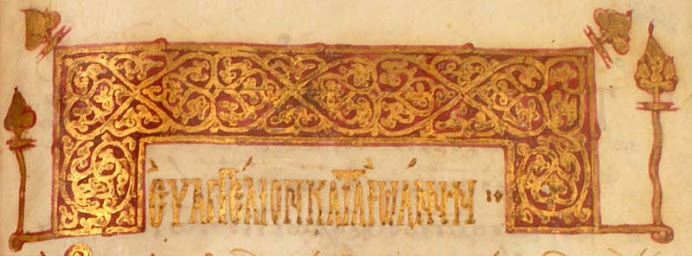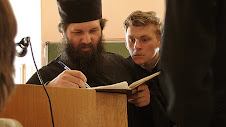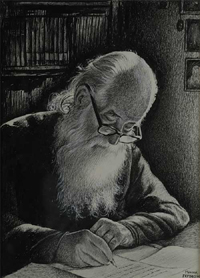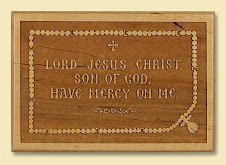 I'm about half way through reading Kyriacos C. Markides' The Mountain of Silence: A Search for Orthodox Spirituality, and have become so frustrated by it that I'm wondering whether to continue. The book is made up essentially of conversations between Dr Markides, a professor of sociology at the University of Maine with a long-standing interest in what can only be called New Age spirituality, and a "Fr Maximos," who is in fact a thinly disguised Fr Athanasios, now Metropolitan of Lismassol in the Church of Cyprus.
I'm about half way through reading Kyriacos C. Markides' The Mountain of Silence: A Search for Orthodox Spirituality, and have become so frustrated by it that I'm wondering whether to continue. The book is made up essentially of conversations between Dr Markides, a professor of sociology at the University of Maine with a long-standing interest in what can only be called New Age spirituality, and a "Fr Maximos," who is in fact a thinly disguised Fr Athanasios, now Metropolitan of Lismassol in the Church of Cyprus.In his Prolegomena, Dr Markides speaks of his journey from agnosticism, to transcendental meditation, to interest in the lay mystics and healers of Cyprus. Having heard of Mt Athos for the first time, he felt himself "ready for an adventure within the mystical, experiential traditional of organized Christianity that survived in a few ancient monasteries unknown to the West and to mainstream Christianity" (5), a "Christian equivalent of Tibet" (6). Herein lies the book's false premise: namely, that there is a specifically "Athonite mystical spirituality" at all. Granted, Mt Athos has an incomparably rich spiritual tradition and is a place of extraordinary holiness; it is not my intention to deny this one bit. As any Athonite monk would insist, however, there is nothing essential present on Mt Athos that can not be found in any Orthodox church where the Eucharist is offered, and nothing inherent in their "spirituality" that can not be found in any other part of the Church, however humble. The spiritual life that the Athonite monks practice, far from having survived in a few forgotten monasteries, is in fact the very heart of mainstream Orthodox Christianity, even if many of its members fail to live up to this standard. Again, this is not to deny that the Holy Mountain has a tremendous spiritual heritage from which we can all profit. My point is, following St Irenaeus of Lyons, that any "esoteric" Christianity is inherently gnostic and therefore heretical. The full wealth of the Church's spiritual treasures are open to all who have entered it.
St Gregory of Nyssa's words on the Holy Land could equally well apply to the Holy Mountain:
We confessed that the Christ Who was manifested is very God, as much before as after our sojourn at Jerusalem; our faith in Him was not increased afterwards any more than it was diminished. Before we saw Bethlehem we knew His being made man by means of the Virgin; before we saw His Grave we believed in His Resurrection from the dead; apart from seeing the Mount of Olives, we confessed that His Ascension into heaven was real. We derived only thus much of profit from our travelling thither, namely that we came to know by being able to compare them, that our own places are far holier than those abroad. Wherefore, O ye who fear the Lord, praise Him in the places where ye now are. Change of place does not effect any drawing nearer unto God, but wherever thou mayest be, God will come to thee, if the chambers of thy soul be found of such a sort that He can dwell in thee and walk in thee. But if thou keepest thine inner man full of wicked thoughts, even if thou wast on Golgotha, even if thou wast on the Mount of Olives, even if thou stoodest on the memorial-rock of the Resurrection, thou wilt be as far away from receiving Christ into thyself, as one who has not even begun to confess Him. Therefore, my beloved friend, counsel the brethren to be absent from the body to go to our Lord, rather than to be absent from Cappadocia to go to Palestine; and if any one should adduce the command spoken by our Lord to His disciples that they should not quit Jerusalem, let him be made to understand its true meaning. Inasmuch as the gift and the distribution of the Holy Spirit had not yet passed upon the Apostles, our Lord commanded them to remain in the same place, until they should have been endued with power from on high. Now, if that which happened at the beginning, when the Holy Spirit was dispensing each of His gifts under the appearance of a flame, continued until now, it would be right for all to remain in that place where that dispensing took place; but if the Spirit “bloweth” where He “listeth,” those, too, who have become believers here are made partakers of that gift; and that according to the proportion of their faith, not in consequence of their pilgrimage to Jerusalem.To add a word from personal experience, when I was a graduate student I attended a tiny little church in the storefront of an old building in a bad neighborhood of a large city. The services were entirely in Church Slavonic, the priest had a speech impediment that made nearly everything he said difficult to comprehend, and not more than two or three old babushki showed up for Vigils. Nonetheless, I came to appreciate that there was just as much holiness in that humble little Bethlehem of a church as anything I had encountered in my travels through the churches and monasteries of the Holy Land, Greece, Russia, and Romania. So, simply put, there's no such thing as a specifically Athonite mystical spirituality that can't be found anywhere else in the Orthodox Church. It's telling that the author never speaks of the Church, only of the Ecclesia, which he defines thusly: "The sum total of the practices, methods, sacred texts, and testimony of saints and their teachings on how to know God. In includes the organizational structure of the Church" (emphasis mine). This is true in so far as it goes, but for Dr Markides it is a way of acknowledging the truth within the Church without identifying the truth with the Church. The "mystical spirituality" of the Ecclesia is something more expansive than the Church itself.
Then there is the problem of Dr Markides' methodology. Here he summarizes how he engaged Fr Maximos in conversation:
In my mind, however, I carried on a continuous but silent dialogue between the teachings of the holy elders of Christianity and the secular thinkers of the West [he names Nietzsche, Freud, and Frankle earlier in the paragraph] as well as the wisdom traditions coming out of Buddhism and Hinduism. When he [Fr Maximos] talked about "purifying the heart," I could hardly avoid contrasting it with the Buddha's "eightfold path." (62)He admits, however, that the very people with whom he was talking would not have approved of this method:
I was fully aware, however, that devout Christians, the Athonite monks included, are averse to any comparisons between Christian revelation and spiritual practice and the mysticism and spiritual exercises of the East. In the eyes of such Christians, comparisons may undermine belief in the centrality and divine uniqueness of Christian revelation, a fear that as an academic I could not share. (62)That is a strange and telling passage. His assessment of the attitudes of many Christians towards a comparative approach is quite true. My own feeling is that there's nothing wrong with an objective comparative approach, but that the author so often gets so many of them so wrong that the reader can easily be misled into making facile comparisons that are in fact completely misleading. One further marvels that the good professor has been so blinded by the academic refusal to make "value judgments" and "truth claims" that he simply refuses to open his eyes to the possibility that the Christian revelation may, in very fact, be true.
The result is that, again and again, Fr Maximos will say something perfectly correct (in fact, I haven't found any of his recorded words in any way objectionable) and then the author will distort them beyond recognition. I'll give just one example. Fr Maximos cites St Maximos the Confessor's use of the term "eros maniakos" to describe the intense love that saints feel for God. He makes a point of saying that this eros was a matter of "shifting your energy exclusively in the direction of God" (emphasis mine). All of this is perfectly correct and Orthodox. But this is how Fr Markides interprets these words:
Having been blessed only with the experience of human eros, I could not possibly fathom what the eros maniakos might feel like. I could only imagine such a state intellectually. I could accept, for example, that all erotic relationships at all levels of intensity from the grossest to the most sublime are different manifestations of the all-consuming love of the absolute God. It is like the sun emanating its rays. Human eros is the experience of the rays. Eros maniakos must be the entrance into the sun itself.In other words, Professor Markides takes the human sexual experience (even the grossest), multiplies it infinitely, and then projects this on God. He even suggests that "the experience of eros maniakos was best captured in stone by Bernini in his portrayal of the Ecstasy of St Teresa, stabbed through the heart by an angel, symbolizing divine love. She surrendered in his arms in a state of ecstatic rapture." Now, as I have argued elsewhere, this is precisely the opposite of what St Maximos in fact taught.
The book's fatal flaw can, to my mind, be captured in the words of the friend who introduced the author to Fr Maximos: "At last we have found a real master who also happens to be a Christian." The emphasis is mine, and critical.
This is not a book I would recommend to anyone who doesn't have a basic grounding in the history and theology of the Orthodox Church. Those who do have this knowledge should be able to cut through the crap, so to speak, and benefit from Fr Maximos' words. As I've written before (I don't recall which post), it is our mission to preach Christ crucified and not "mystical spirituality," Athonite or otherwise. All of that is premised upon entry into the Church through Baptism.
This book could have been a real treasure if only the author had written himself out of it.









8 comments:
I've heard similiar criticism of the book in other forums, by clergy and lay-folk alike. It was recently donated to our church library (not actively sought out, praise God), and I am constantly tempted to "misplace" it.
The torturous thing is that there really is a lot of good in it -- essentially everything that Fr Maximos says -- mixed in with all the New Age rubbish. If I were you I'd have your librarian sit on the book and lend it out only by request and with a bit of a stern lecture.
Dear Father,
Father bless! Forgive me for my "dyerzost'" but I am puzzled by a few of your comments. Perhaps you might clarify them for me.
First, let me say that I agree with most of your conclusions about Markides. I have read nearly all of his books ("Riding the Lion", etc.) and have always been suspicious of his both his premises and approach. I am not in disagreement about anything that you have written about Markides.
However, it seems 0dd that you would write about grace as if it were something could be measured and quantified, and that such a measure occurs in equal portion wherever there is the presence of the Eucharist. You write, "I came to appreciate that there was just as much holiness in that humble little Bethlehem of a church as anything I had encountered in my travels through the churches and monasteries of the Holy Land, Greece, Russia, and Romania." I can appreciate the theoritical idea that the Eucharest equalizes all experiences of grace in an absolute sense. But surely there is palpably "more" grace (for example) at the relics of St. John of San Francisco at the Holy Virgin Cathedral in San Francisco than at the Greek Church just down the street where there is not only no presence of the sancfified body of a saint, but where basketball and ethnic festivals seem to take priority over liturgy and holiness. I understand your argument in a very dry, academic, "orthodox" sense, but my experience of two places such as these, in spite of the fact that they are both sanctified temples where the Holy Altar and Gifts are present, cause me to believe that there is definitely a qualitative, if not a quantitative, difference in the grace abiding in the two places.
Secondly, I am troubled by your comment that "any 'esoteric' Christianity is inherently gnostic and therefore heretical." If we take the word "esoteric" literally as "inner" (rather than "occult" or "black magical" as it is misconstrued today, and which meaning, I assume is implied by your the surrounding quotes), then I am sure you cannot deny that there are some people for whom Christianity is merely an outer (exoteric) showing of social, political, or ethnic solidarity, and others for whom the Way of Christ is nothing less than a path for inner transformation. This second inner type of Christian is precisely one whom St. Clement of Alexandria as "gnostic". So, how is it, then, that an esoteric and gnostic Christianity is inerently "heretical". By this definition, our spirituality must be exoteric, outward, and ignorant to be truly Orthodox. Surely this is not what you mean.
I point this out because it seems that the last wave of Orthodox converts (let's say, over the last 20 years) has brought with it a kind of fundamentalist obscutrantism and anti-intellectualism that is foreign to the spirit of the Universal Church. Today's orthodox "anti-gnosticism" smells very much like the kind of americanism that is suspicious of all mystical, gnostic, or other "impractical" ways to approach God.
The fact is, gnosis is part and parcel of the Orthodox Way. It is as fallacious to do away with true gnosis in Christianity as it is to do away with any of the Holy Sacraments. In fact, true Christian gnosis has as much to do with the heresy of "gnosticism", as Baptism has to do with the Southern Baptists. Should the Orthodox Church do away with Holy Baptism just because there happen to be a bunch of nutty heretics down in Alabama who go by a similar name?
Up to now I have been edified by your intelligent and creative blog. I am sure that these matters are only differences in terminology and that we are essentially of one mind, as I have been with you and your writings so far.
Sincerely,
Seraphim Winslow
I'm going to reply first to Seraphim ("Simka") first.
My intention was not to quantify and measure Divine Grace, but to counter Dr Markides' claim that there is a spirituality exclusive to Mt Athos. If anything, my intention was to argue that God's Grace is precisely *not* limited, quantified, or qualified by geographic location, and I think I'm following St Gregory of Nyssa on this point. To say that there is more Grace in one Orthodox parish than in another Orthodox parish down the road, to my mind, serves to qualifie Grace by making it less absolute: it's here, but not there. If we accept that both the Russian and the Greek parishes you mention are Orthodox, then we cannot deny that the sanctifying Grace conveyed in the Holy Mysteries (not just the Eucharist, but the whole liturgical life) is the same.
You yourself first complain that I "write about grace as if it were something could be measured and quantified," but then you go on to write that "there is definitely a qualitative, if not a quantitative, difference in the grace abiding in the two places." So which is it? What standard do we use? Subjective experience?
According to my understanding of St Gregory Palamas, Grace is essentially another term for the Divine Energies. One can draw a parallel between Essence and Energies and the sun and its rays. Just so, God's Divine Energies (i.e., Grace) permeate all of creation. One can't escape it, try as one may. Divine images/icons (including relics) are any material image that point us towards God, as St John Damascene writes, and therefore are worthy of veneration. As he writes, if you have two sticks, you've got two sticks: but make a cross of them, and you have something holy and worthy of veneration. So I hope that we can agree so far that God's Grace/Energy equally penetrates all of creation and that all Holy Mysteries served at all Orthodox Churches are equally salvific and deifying, basketball court or not.
That said, there are certainly places in which God's Grace is especially tangible, so to speak. There's no experience like venerating the Holy Sepulcher. I myself have venerated in awe the relics of St John of SF, and can testify to their radiant holiness. All that said, I don't see how it can be said that church X is somehow more Grace-filled than church Y, so long as they're both Orthodox. One church may be more conducive to prayer than another, and may even feel to be more holy than another, but one can't limit the actions of the Holy Spirit: He is everywhere and fills all things.
On to the question of the esoteric. What I mean by this is that there is some mystical experience which is closed to the average faithful but is available to the privileged or enlightened few, which I see as the essence of gnosticism, and I hope to be following St Irenaeus on this point. Certainly we are called to "gnosis," in the sense of understanding or wisdom -- but not in the sense of some hidden (i.e., esoteric) way. Yes, there is an inner Christianity passed on from spiritual father to spiritual son which results in wisdom (see the Hagioritic Tome), but this is open to *everyone*, including those not strictly under the guidance of a spiritual father, so long as they find a spiritual father within the Fathers themselves. Think of St Paisius Velichkovsky.
I welcome your reply; we may still be ships passing in the night.
Anonymous:
Thank you for your interesting and extensive comment. Are these your own recollections? It does seem that Dr Markides is indeed an opportunist posing as a disinterested conveyor of the wisdom of others, while himself raking in the fame (and fortunes). If he had not made himself the central character of "The Mountain of Silence," and had simply let Fr Maximos speak for himself, the book would have been infinitely richer. I've heard that Metropolitan Athanasios (the model for Fr Maximos) has himself lamented that Professor Markides is in fact not a Christian. (Indeed, he never identifies himself as such in his book, always hiding behind his role as an objective academic.)
I'm afraid I know nothing about Daskalos. What was his relationship to Christianity in general, and Orthodox Christianity in particular?
"This book could have been a real treasure if only the author had written himself out of it."
I absolutely agree with this. I have thought this more or less myself.
I am a bit pleased to see a few folks not overwhelmed by gushing enthusiasm for this book and text.
I discerned that the author has little 'if any' true exposure to a Protestant Christianity and seems eager to jump into a sort of false dichotomy, ie the Evil West with all of its error VS the pure and pristine East, where Christians and their faith stand in their original perfection. It may be great self congratulations for Orthodox Parishioners, but let us be candid.
Orthodox churches have their own special set of distractions and problems.
It is far too easy to dis on the Western Mindset, while ignoring ones own vices.
To the point, had I read this book as an introduction to the Orthodox faith, I would not have been inspired to seek further.
Far better a book like "Father Arseny".
Bless you; but I could not disagree with you more. And yet I see your point. Interesting.
The professor is writing as an evangelist to the New Age college educated crowd. Not the church or those who already have discovered Orthodoxy. I've given this book away like a Baptist hands out Bible tracts.
And, why in the world would any of us want to "write ourselves out"? This is the strongest item we have to show the world the Christ.
Bp. Kallistos said last year that his job on the planet is to "be Kallistos". Amen. And I'd add, "write himself in".
-Dan, OCA, Santa Cruz Mountains
(look for my memoir Aug. 2014, Sex With Librarians and God)
Post a Comment